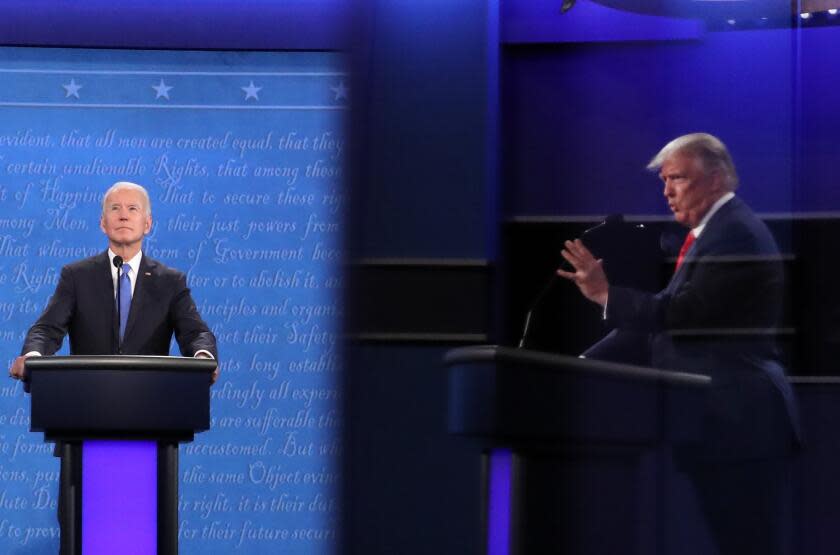Column: In Biden-Trump debate, what they do — not what they say — could determine the winner

After weeks of hype, much spin, great speculation and huge billows of hot air, two men seeking the White House will share a stage for 90 minutes Thursday night in Atlanta.
When they're not staring death rays or unleashing insults, Joe Biden and Donald Trump — who plainly loathe one another — will discuss issues. Presumably, those will include crime, immigration and the economy, which are top of the mind for many voters.
But if there's a breakout moment for either candidate, it's not likely to involve, say, a startling new position on abortion, or a deep dive into the oil depletion allowance.
If substance were all that mattered, the evening's (ideally) thoughtful and enlightening exchanges would mostly determine how viewers assess the debate and rate the candidates' performances.
But for most of those watching, what the two men say will be much less important than how they say it — or any of the nonverbal cues that Biden and Trump put across during their finite time together on a soundstage at CNN headquarters.
Read more: Column: Biden-Trump debate nears amid hopes to avoid another Dumpster fire
"Posture, gestures, facial expressions, tone and quality of voice matter more than the actual words themselves," said Raymond Zeuschner, a retired professor of speech communications at Cal Poly San Luis Obispo, who has written five books on debate and communication.
("The Debater's Guide," which he co-wrote, has become a standard text more than 60 years after its publication. It was recently translated into Chinese.)
Sticklers insist it isn't a true debate between Biden and Trump. That would require a formally established set of rules and a more specifically tailored format, including the opportunity for one candidate to vigorously cross-examine the other.
Zeuschner called the meeting of the two antagonists "a joint appearance, or joint press conference," like those presidents often hold with a foreign head of state.
But regardless of how you describe it, the session will be a rare nationally shared moment in this age of fragmented media and fleeting attention spans.
As such, the debate will serve as an important mile marker in a contest that, polls suggest, is dead even just over five months from election day. While it's not likely to be determinative, the face off could shake up the race after months of little to no change.
The goals for Biden and Trump alike are straightforward: Destroy the standing and credibility of his opponent.
For those watching, the purpose may be edification, entertainment or both. (Given how unpopular both candidates are, a certain amount of masochism can't be ruled out.)
The 1½-hour meeting, with two commercial breaks, might even help some wavering or undecided voters make up their minds. A second — and presumably final — debate is scheduled for September.
Read more: Calmes: Is this going to be the most performative presidential debate ever?
Most who tune in will be supporting one candidate or the other. Many will be watching in hopes of reassurance:
That Biden, at 81 the oldest president in American history, is physically and mentally up for another four years on the job;
Or that Trump, 78, intends to focus on the needs of the country more than his personal grievances.
There is a sliver of voters who may have just started paying attention to the race, and for them the explication of issues may provide some new and valuable information.
But as Alan Schroeder, a debate expert at Northeastern University, noted, "There are other, better venues to learn about policy positions."
The joint appearance Thursday night offers a rare chance, he said, "to really see the candidates in this awkward, improvisational situation they cannot control."
That's why he'll be watching closely for those important unscripted moments.
Is Biden positioned behind his lectern, or will he walk onstage to take up his position at the start of the debate? Can he do so without seeming stiff or enfeebled?
Will the two men shake hands, as courtesy and tradition call for? Will Trump invade Biden's space, the way he stalked Hillary Clinton?
"We sometimes forget those are two human beings standing up there," Schroeder said. "How they respond to each other gives us some idea who they are as people."
Read more: Column: The Biden-Trump debate will be a demolition derby. But will it change the race?
History recalls some famous zingers, among them Ronald Reagan's dismissive swipe at Jimmy Carter ("There you go again") and Lloyd Bentsen's brutal takedown of Dan Quayle ("You're no Jack Kennedy.")
But it's often been the unplanned, unspoken moments that have resonated most with voters and helped shape an election's outcome.
Richard Nixon sweating. George H.W. Bush stealing a glance at his wristwatch. Al Gore sighing.
Unless something catastrophic happens Thursday night, a debate held in June — the earliest in history — is not likely to determine the result of an election taking place in November.
But the 90 minutes in Georgia will shape perceptions of the race and the two candidates and color the next several weeks of conversation around the campaign — at least until the two meet again.
That could go a considerable way toward determining which of them takes the oath of office next January.
Get the latest from Mark Z. Barabak
Focusing on politics out West, from the Golden Gate to the U.S. Capitol.
Sign me up.
This story originally appeared in Los Angeles Times.


